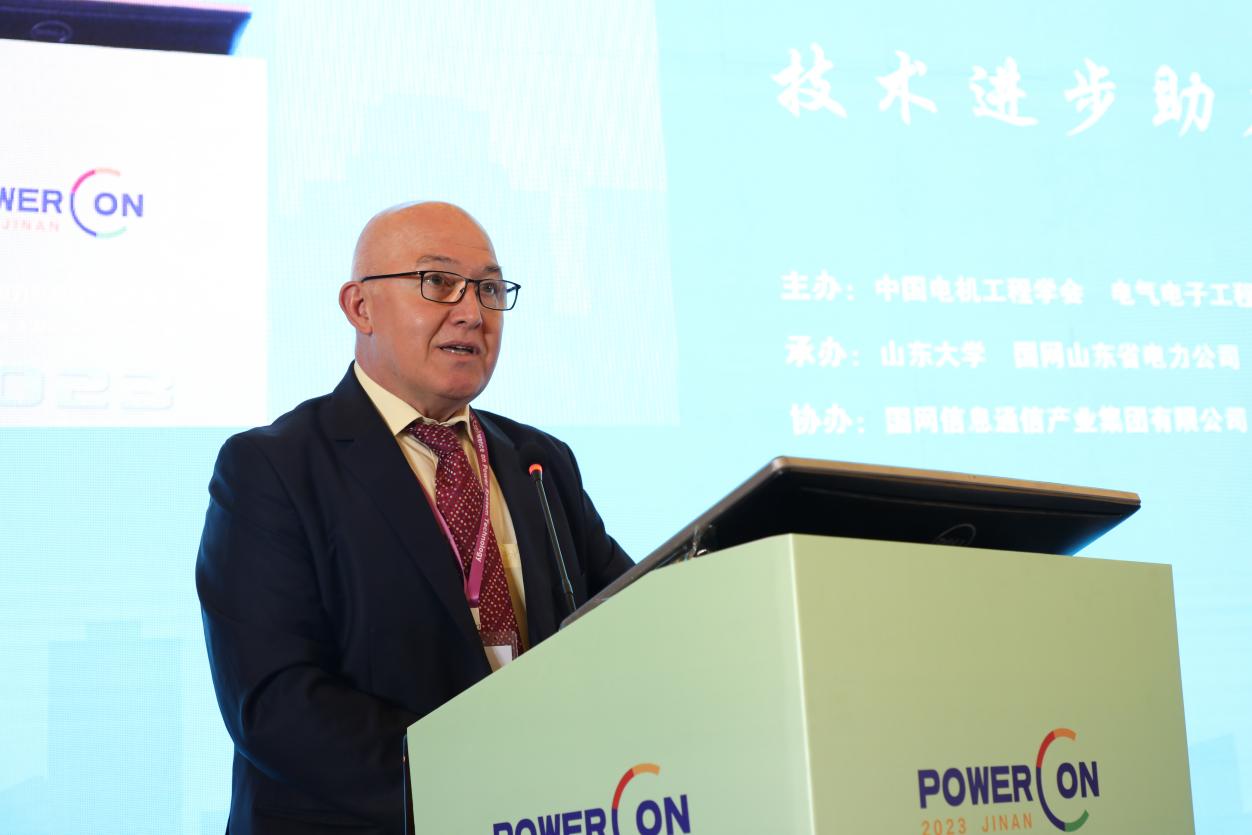Fascination of Electrical Engineering
By LONG Yun & BI Weizi

Professor Vladimir Terzija speaks at PowerCon 2023 held in China. (COURTESY PHOTO)
Vladimir Terzija, a distinguished visiting professor at Shandong University (SDU) is an important figure in the field of electrical engineering and electrical power systems. On an afternoon just after New Year's Day, he shared some of his thoughts on exploring the secrets and complexity of electricity with Science and Technology Daily.
Inspired by predecessors
"Electricity has always been fascinating to me," Terzija said, adding that he was inspired by the legendary Serbian inventor Nikola Tesla.
The Wide-Area Monitoring, Protection and Control (WAMPAC) is one of his research focus areas. Terzija regards it as a complex but inspiring technical system. "It involves satellites, communication channels, and specialized sensors like time-synchronized phasor measurement units," he explained. This system plays a crucial role in monitoring, controlling, and protecting modern electrical power systems.
Terzija said music serves as a muse for his research. He intertwined his passion for music with the complexities of power system frequency measurement. His scientific contributions lie in creating new, efficient digital algorithms for power system frequency measurement, which are now integrated into modern digital devices and WAMPAC systems worldwide.
However, his journey doesn't stop there. Terzija connects his fascination with music to the world of electrical arcs, revealing the complexities of this natural phenomenon. On his journey of discovery, he developed mathematical models for electrical arcs and applied this knowledge to designing digital algorithms for the protection of transmission networks.
Reliable, secure, green
"The Chinese electrical power system is huge and strong, covering a huge geographical area," he said. With more than 1.4 billion people relying on a robust, secure, and reliable power supply, preventing faults and blackouts becomes crucial. The WAMPAC system, designed to address faults and prevent blackouts, greatly supports China's defense against power system outages.
By understanding the system's dynamics through monitoring based on satellite technology, China has designed an effective defense mechanism. This defense system, built on the results of Terzija's research, contributes to the efficiency, security and reliability of the Chinese electrical grid.
Beyond blackout prevention, Terzija's research has also focused on addressing real-world challenges related to Smart Grid applications and multi-energy systems. The increasing complexity of modern power systems, which integrates renewable energy sources and storage units into power grids, demands advanced technology. His work in Smart Grid applications supports the secure and reliable operation of these complex systems.
Moreover, Terzija emphasizes the integration of various energy systems as a solution to maximize renewable and green energy utilization. He highlighted the potential solution lies in the integration of various energy systems, such as combining electricity and heat systems or electricity and gas systems, or even all these together.
Through this integration, a flexible operation of the overall system can be achieved, leading to the optimization of renewable energy resource usage. From his perspective, flexibility and diversity play crucial roles in reducing CO2 emissions in order to achieve clean energy generation and ultimately meet net-zero targets.
As the editor-in-chief of the International Journal, Electrical Power and Energy Systems (Elsevier), Terzija envisions a future where power systems seamlessly meet the demands of modern society. He is ready to embrace cutting-edge technologies, saying, "I am insisting on those solutions involving the most modern technology, smart grid solutions based on new sensors, advanced technology communication infrastructure, and complex and robust algorithms based on artificial intelligence. These will make our power system resilient and economical."
Fruitful collaboration
Terzija's collaboration with SDU since 2012 has been evolving constantly. The cooperation began with Professor Ding Lei, Dean of the School of Electrical Engineering at SDU, and their joint efforts in developing algorithms for the prevention of power system blackouts, which laid the foundation for new groundbreaking solutions.
"Today, algorithms are recognized as very efficient solutions, which are applied worldwide," said Terzija. The collaboration has expanded with strong support from many well-known Chinese scholars at SDU, opening doors to numerous collaborative projects. Meanwhile, he stressed the students' role in contributing to the quality and quantity of scientific results that they have achieved by now.
Commenting on his Chinese co-workers, Terzija said, "They are inspiring me. Their ambitions are motivating me to be even more involved in this activity." According to his former student Jin Zhaoyang, now an associate professor at SDU, Terzija consistently motivates students, propelling them forward to face challenges in both research and life.
In terms of research endeavors, his focus lies on addressing Big Data challenges in secure and reliable power system operations, as well as exploring topics related to the digitalization of the grid.
"One of my key duties is to make sure that a new generation of successful and capable professors take over the research activities which I'm running now," he said.
This article is also contributed by WU Ke from SDU.


